Attracting and keeping the best sales team is essential to success. But how do you ensure your sales team is motivated to perform their best? One of the most effective ways to motivate your sales team is through a well-crafted compensation plan for your sales team.
A sales compensation plan is a formal structure that outlines how salespeople are rewarded for their performance in generating sales revenue for a company. The plan typically includes a mix of base salary, commissions, bonuses, and other incentives that are tied to achieving specific sales targets or objectives.
A sales compensation plan aims to motivate and incentivize sales teams to work harder and more effectively to generate revenue for the company. By providing a clear and transparent structure for how salespeople are compensated, the plan can help align individual goals with the organization’s overall objectives.
In 2023, many companies are learning that AI used in sales can be a powerful tool for structuring a compensation plan.
In this article, we’ll look at some of the best sales compensation plans to help motivate your sales teams and keep them engaged and how AI can help you craft such a plan.
We’ll discuss the benefits of each method, including what should be included, how your plan helps your team, some common compensation plans companies use and how they can be tailored to fit your company’s unique needs.
What Should Be Included in a Sales Compensation Plan?
When designing a sales compensation plan, it’s essential to consider what sort of plan will incentivize and motivate your sales team. A well-crafted plan should include short-term and long-term rewards recognizing individual performance and team success.
To ensure team members are adequately motivated, there should be a balance between the commission and base pay. Offering a competitive commission percentage is vital, but base pay should also be taken into consideration. Additionally, bonuses should be offered based on reaching specific goals or benchmarks.
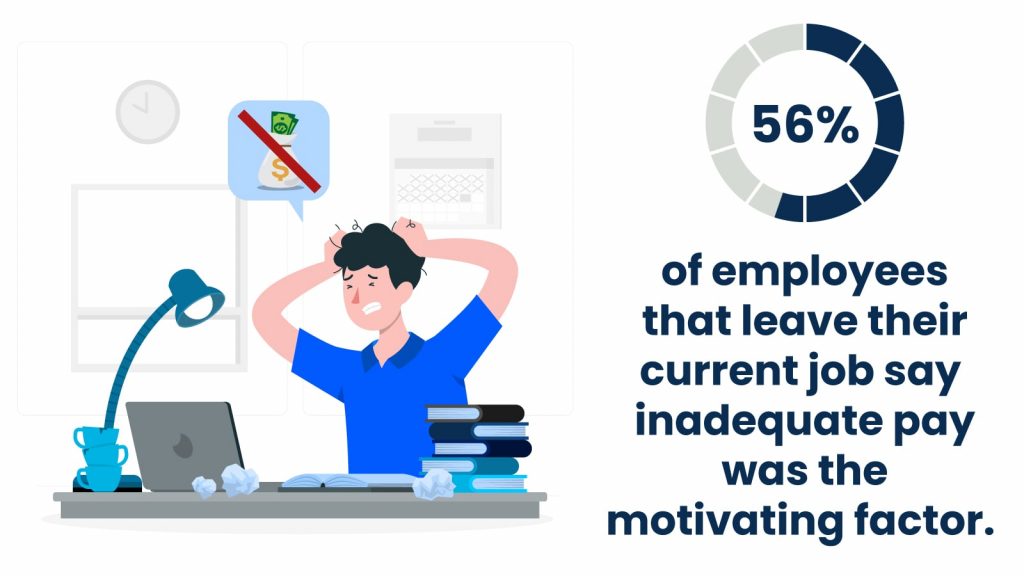
Many companies are using AI in sales to find the right benchmarks in structuring pay. This will help motivate team members to work hard and stay motivated to reach new goals while providing an extra incentive for doing so.
With AI used in sales, you can target the strengths and weaknesses of your team to help find a compensation structure that plays on their strengths and encourages working on weaknesses.
Your compensation package must be clearly communicated to everyone on the team, so they know exactly what they need to do to achieve success.
The company should also set realistic yet challenging goals that align well with the company’s overall business strategies and can be tracked easily by the salesperson and the manager. With the rise in AI tools, this can even be automated to support both the sales team and management.
By offering these types of rewards with other benefits such as career growth opportunities and recognition for high performance, the company can create an effective sales compensation plan that will keep teams motivated and performing at their best.
How Does a Sales Compensation Plan Help Motivate Your Team?
A sales compensation plan is a powerful tool to keep your team motivated to push to be the best they can be. With AI used in sales compensation plans, you can efficiently create a well-laid-out plan that provides incentives that encourage your team to work hard and strive for success in a way that benefits both themselves and the employer.
Not only that, but a desirable compensation plan is critical to attracting top sales talent for your company. According to the Society For Human Resource Management, 44% of managers Use AI in sales recruitment to identify the best candidates based on public data.
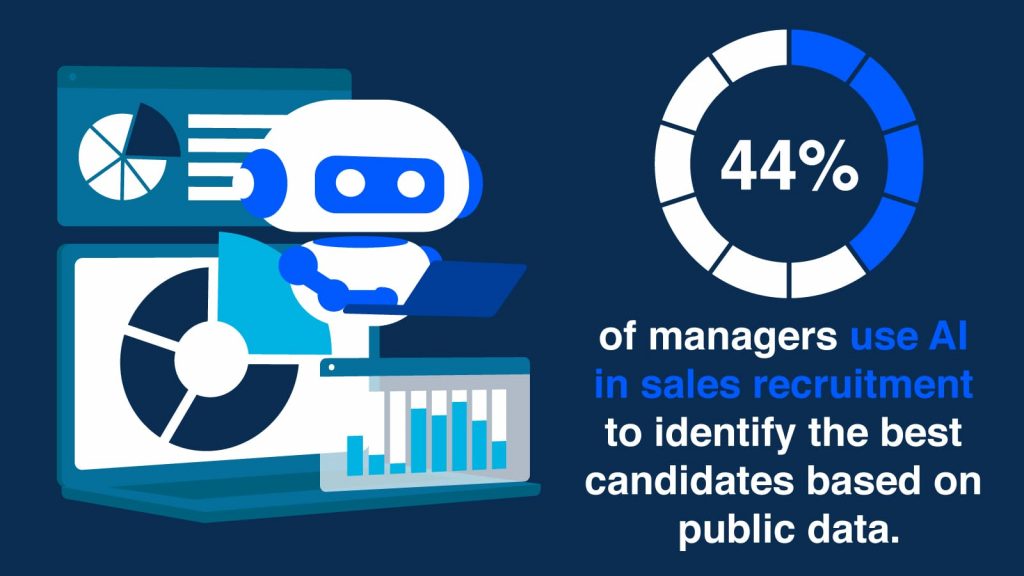
Regardless of the compensation package you choose, it can be designed to fit any company’s needs, giving you the flexibility to craft a plan that works for you while allowing for room to adjust for further success as needed.
A well-designed sales compensation plan will help motivate your team by providing clear goals for them to strive for and tangible rewards when they hit each goal. This structure gives employees obtainable milestones, which helps them stay focused.
It also encourages teams to work together towards shared goals, as bonuses are often associated with the team meeting specific targets. Additionally, having a well-defined plan allows everyone on the team to understand what they need to do to reach their desired objectives.
A well-thought-out sales compensation plan can provide an essential foundation of motivation within any sales team, helping keep everyone focused on the end goal while still feeling rewarded and appreciated for their hard work.
They create an environment of collaboration and dedication that leads directly to success – individually and as a group.
When mixed with ongoing training, and artificial intelligence software to monitor and track performance, you can also help your team steadily progress to beating previous goals with experience and technology.
What is a Tiered Commission?
A tiered commission is a sales compensation plan that rewards sales teams for reaching certain milestones. This type of commission encourages employees to strive for higher performance levels and motivates them to achieve the highest level.
By providing multiple levels of incentives, companies can provide more recognition and reward for their team members at different levels.
For example, a tiered commission might start with a base salary and bonus for achieving specific goals. Then, as the sales team meets higher targets, they receive additional bonuses or other forms of compensation on top of their base salary.
This allows businesses to reward their teams in meaningful and motivating ways. It also helps promote collaboration among members since they work together to achieve the highest possible performance.
When a salesperson makes a sale, their commission is calculated based on their performance level and the corresponding commission rate.
The advantages of a tiered commission include the following:
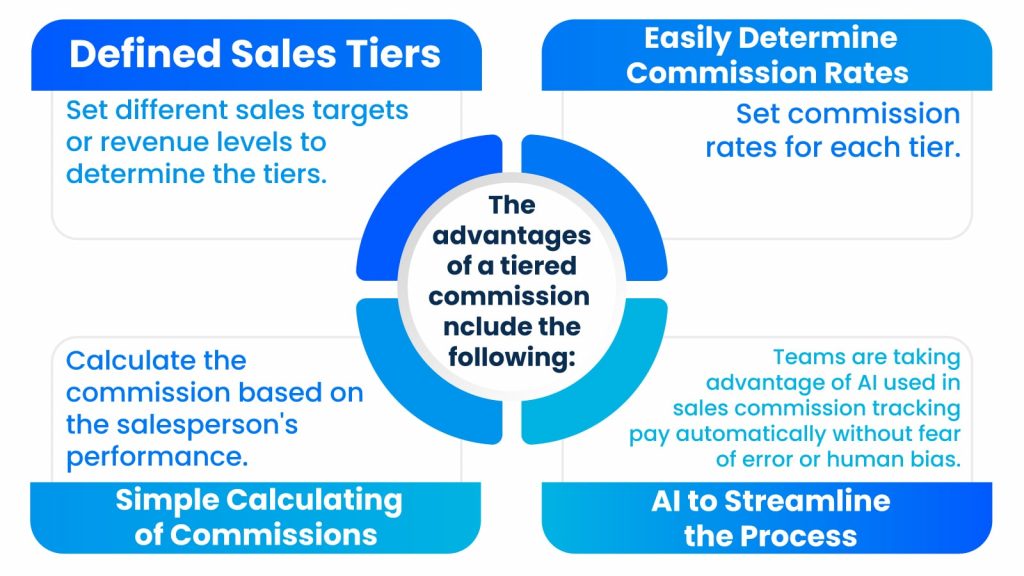
Defined Sales Tiers
Set different sales targets or revenue levels to determine the tiers. For example, the first tier could be $0 to $10,000 in sales, the second tier could be $10,000 to $20,000, and so on. As the salesperson reaches each tier, there can be additional bonuses and compensation to feel the team motivated.
Easily Determine Commission Rates
Set commission rates for each tier. Commission rates typically increase as the salesperson moves up the tiers. For example, the commission rate for the first tier could be 5%, the second tier could be 7%, and so on. Another idea is to offer flat pay bonuses for each milestone, or a combination of both.
Simple Calculating of Commissions
Calculate the commission based on the salesperson’s performance. If a salesperson achieves $15,000 in sales, they would earn a commission of 5% on the first $10,000 and 7% on the remaining $5,000.
Or alternatively, you can offer a flat commission on all sales after the milestone is reached. So, if they hit the second tier, all of their sales would get a 7% commission.
AI to Streamline the Process
Teams are taking advantage of AI used in sales commission tracking pay automatically without fear of error or human bias.
Unfortunately, a tiered commission system can also have some disadvantages. The disadvantages of a tiered commission include:
- It can be complicated to administer and track.
- It may create competition and tension among sales team members.
- It may only suit some sales roles or industries, particularly those with long and complex sales cycles.
How Straight Salary Works
A straight salary is a popular way of compensating sales teams. It’s one of the most straightforward plans, and it doesn’t require complex calculations to determine how much each team member earns.
With this type of compensation plan, every employee receives a fixed salary for their work regardless of how much they sell. Tesla is one company that pays its car salespeople a straight salary.
The advantages of a straight salary are clear. Next, we will look at some advantages of straight salary in sales.
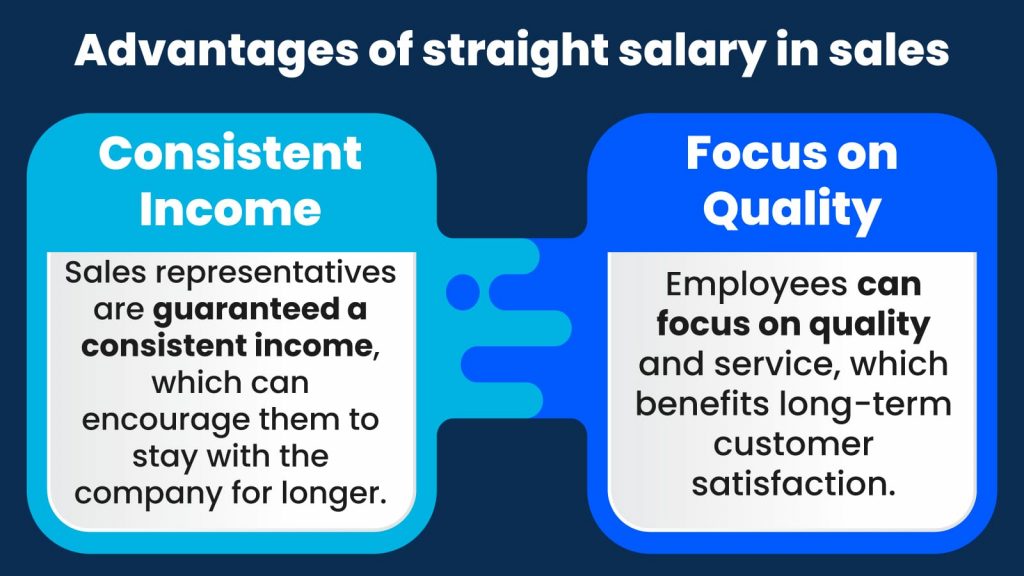
Consistent Income
Sales representatives are guaranteed a consistent income, which can encourage them to stay with the company for longer. This compensation plan also eliminates any conflicts between team members over commission amounts.
Focus on Quality
Another key benefit is that employees can focus on quality and service, which benefits long-term customer satisfaction.
One way teams can take advantage of AI used in sales when determining a straight salary is by using AI software to use historical data and trends to predict future sales performance. This can help salespeople set realistic targets and adjust their strategies accordingly while compensating the sales staff.
However, a straight salary is not always the best way to keep sales teams motivated. Since everyone receives the same amount regardless of performance, employees are less incentivized to be productive and make higher-value sales.
In order to maximize their profits, businesses may need to consider other types of compensation plans that reward top performers while still providing benefits to all members of the team.
What is Straight Commission
The straight commission is a popular sales compensation plan that rewards employees based on the number of goods and services they sell. It’s an attractive option for businesses since it links pay directly to performance. This type of plan also benefits sales teams, providing a powerful motivation to achieve goals and earn more money.
However, a straight commission compensation plan can also have drawbacks.
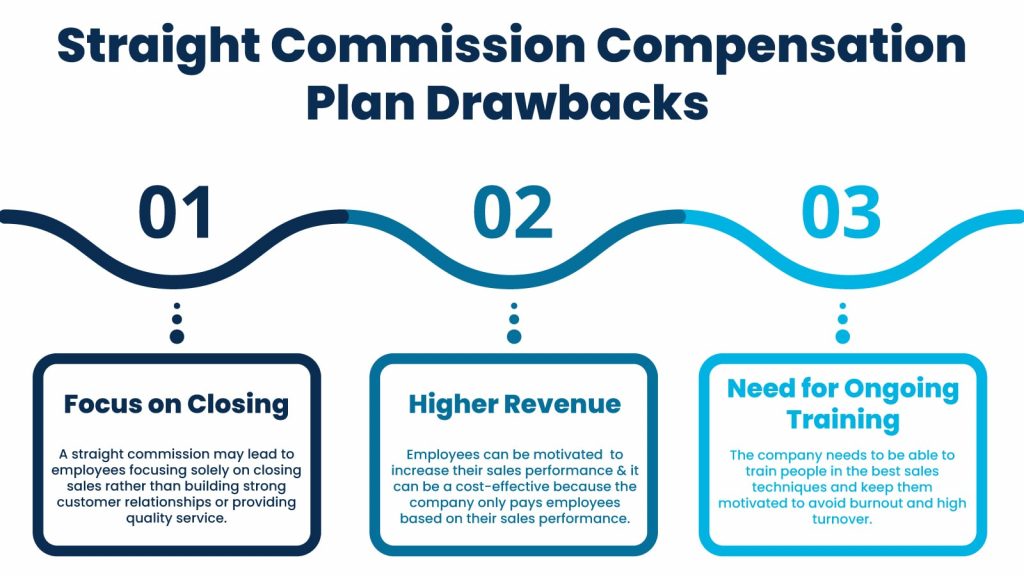
Focus on Closing
A straight commission may lead to employees focusing solely on closing sales rather than building strong customer relationships or providing quality service. It can also create unexpected costs for the company, such as higher commission payouts during periods of high sales volume.
However, many companies rely on AI used in sales team analysis to locate problem areas of such a process and isolate them for improvement. Some more trailblazing companies such as Optymyze are also using AI software to create a more dynamic commission process that factors in long-term client satisfaction.
Higher Revenue
One advantage of a straight commission plan is that it can motivate employees to increase their sales performance and generate more revenue for the company. Additionally, it can be a cost-effective compensation plan as the company only pays employees based on their sales performance.
Need for Ongoing Training
For a straight commission to be successful, the company needs to be able to train people in the best sales techniques and keep them motivated to avoid burnout and high turnover.
In addition, if sales targets are too high, or if employees feel like their efforts need to be rewarded reasonably, it may not be suitable for employees in roles with limited control over sales outcomes, such as customer service or technical support.
Salary + Commission Plan
Salary plus commission is a common sales compensation plan that can help motivate sales teams. This type of plan allows salespeople to receive a fixed salary while also providing an incentive to reach their sales goals.
Since the commission is based on performance and not just hours worked, it incentivizes employees to work hard and strive for success to maximize their compensation.
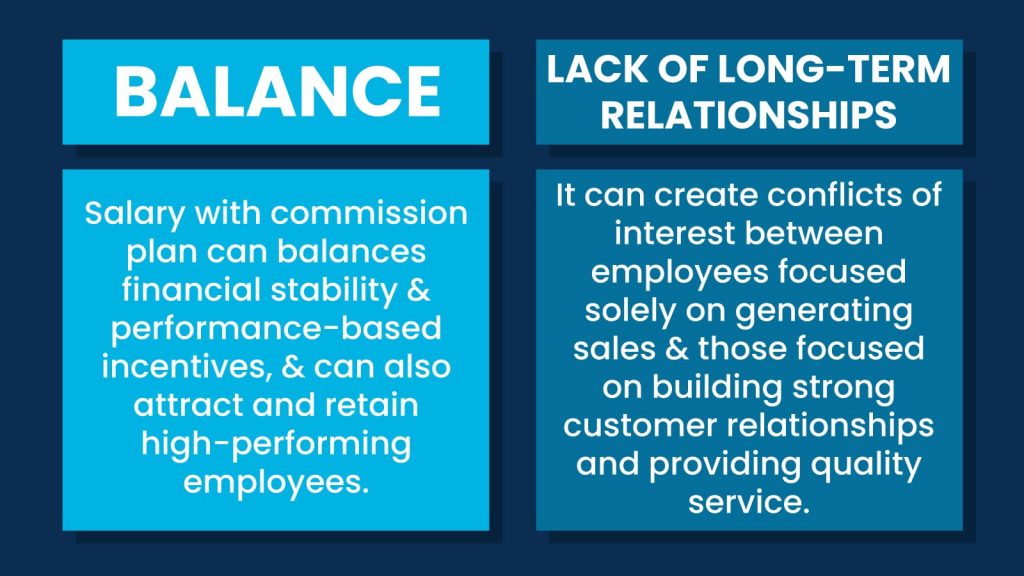
Balance
One advantage of a salary with a commission plan is that it balances financial stability and performance-based incentives. It can also attract and retain high-performing employees seeking a more dynamic compensation package.
Lack of Long-Term Relationships
However, a salary with commission plan may also create conflicts of interest between employees focused solely on generating sales and those focused on building strong customer relationships and providing quality service.
Some sales leaders are solving this by taking advantage of AI used in sales analysis to identify people and areas lacking in certain aspects to help them improve. In addition, it may also create unexpected costs for the company, such as higher commission payouts during periods of high sales volume.
However, as with the pain points of the sales process, AI software is also used to anticipate periods of potentially higher sales, helping to overcome this potential issue.
Territory Volume Commission
When motivating sales teams, territory volume commission is one of the best compensation plans. This plan incentivizes teams to increase their sales by offering a bonus for meeting or exceeding a certain amount of total sales in a specific territory.
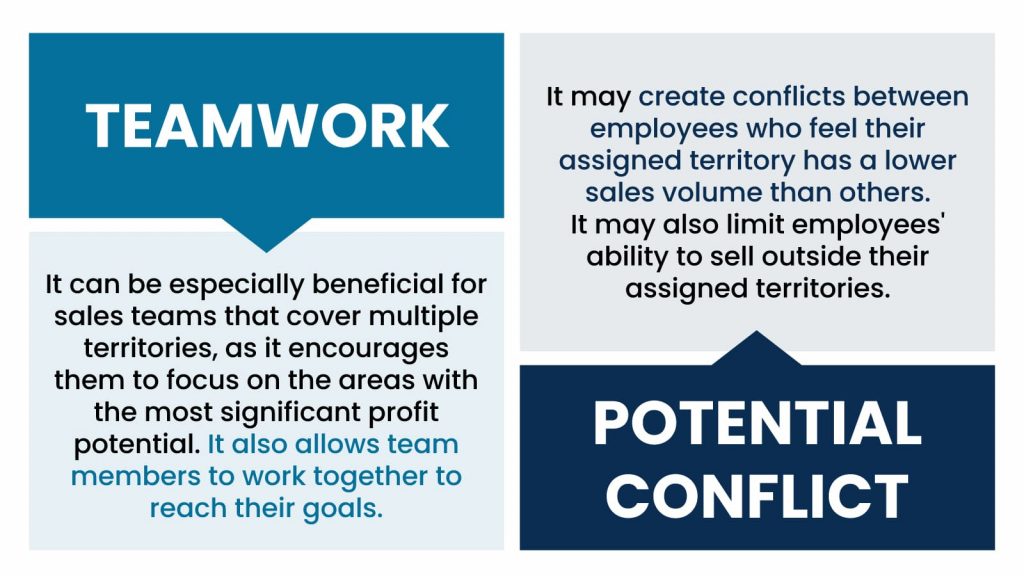
Teamwork
This commission plan can be especially beneficial for sales teams that cover multiple territories, as it encourages them to focus on the areas with the most significant profit potential.
It also allows team members to work together to reach their goals, as they can reward each other’s efforts and build off one another’s successes. Additionally, it gives team members tangible targets they can strive to achieve and makes them accountable for their performance.
Potential Conflict
However, a territory volume commission plan may also create conflicts between employees who feel their assigned territory has a lower sales volume than others. It may also limit employees’ ability to sell outside their assigned territories and may not be suitable for industries where sales territories must be clearly defined.
AI Used in Sales to Optimize Territories
AI used in sales team assistance can be incredibly valuable as well. AI can analyze and target problem areas, people, and clients needing new equipment and services and delegate responsibility automatically based on who is closest and available.
Software can provide a team SWOT analysis to determine the best salesperson for the particular customer to boost chances of success. Artificial intelligence software can help the entire team delegate and succeed together.
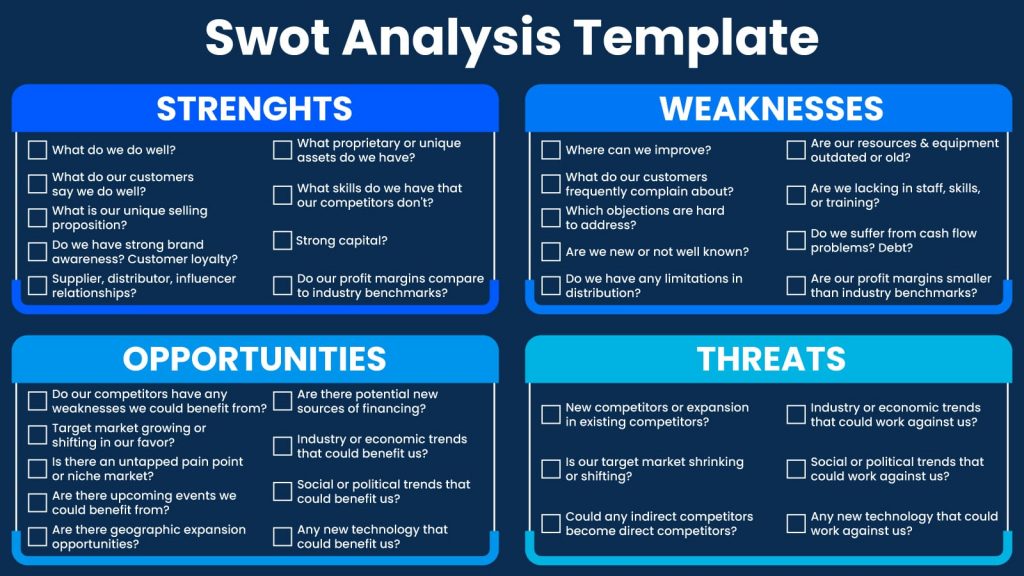
Draw Against Commission
Draw against commission is an effective sales compensation plan that can be used to motivate sales teams. It combines a portion of the salesperson’s salary with a bonus, allowing them a steady income while still incentivizing them to hit their targets.
This structure enables employees to see immediate rewards and gives them something to strive for.
Additionally, drawing against commission provides stability and security for the employee; if they meet their goals, they will get their salary.
Here’s how it works:
- At the start of a period (usually a month), the employee is given a draw or advance payment based on their expected commissions.
- Throughout the period, the employee makes sales and earns commissions.
- At the end of the period, the employee’s commissions are calculated and compared to the draw they received.
The employee usually keeps the difference if the commissions earned are higher than the draw. If the commissions earned are lower than the draw, the employee may be required to pay back the difference to the employer.
Many teams are even taking advantage of AI used in sales to automate the process of monitoring draws and commissions to avoid overpayment and underpayment when balancing out the amount to be drawn out in advance.
Constant Pursuit of Progress
This plan also encourages employees to take more risks to pursue higher goals. If they exceed their target, it can lead to increased earnings, giving them even more motivation. Furthermore, it ensures that the sales team works together; everyone benefits from the rewards when one employee succeeds.
As such, drawing against commission plans is an excellent way of motivating sales teams and helping them reach their goals efficiently and effectively.
Final Thoughts
Finding the right sales compensation plan that motivates your team is essential. Various options fit different needs, such as tiered commission, straight salary, straight commission, salary plus commission, territory volume commission, and draw against commission.
When deciding which is best for you, consider what will motivate your team the most and how achievable targets are. It’s also essential to make sure everyone understands the plan and can use it as an incentive to reach their goals.
Overall, creating a compensation plan with the help of AI used in sales processes can help you make data-driven decisions that align with the objectives of your business.
By analyzing past performance, identifying top performers, and setting achievable targets, AI can assist in designing a sales compensation plan that motivates your team and drives them toward success.






